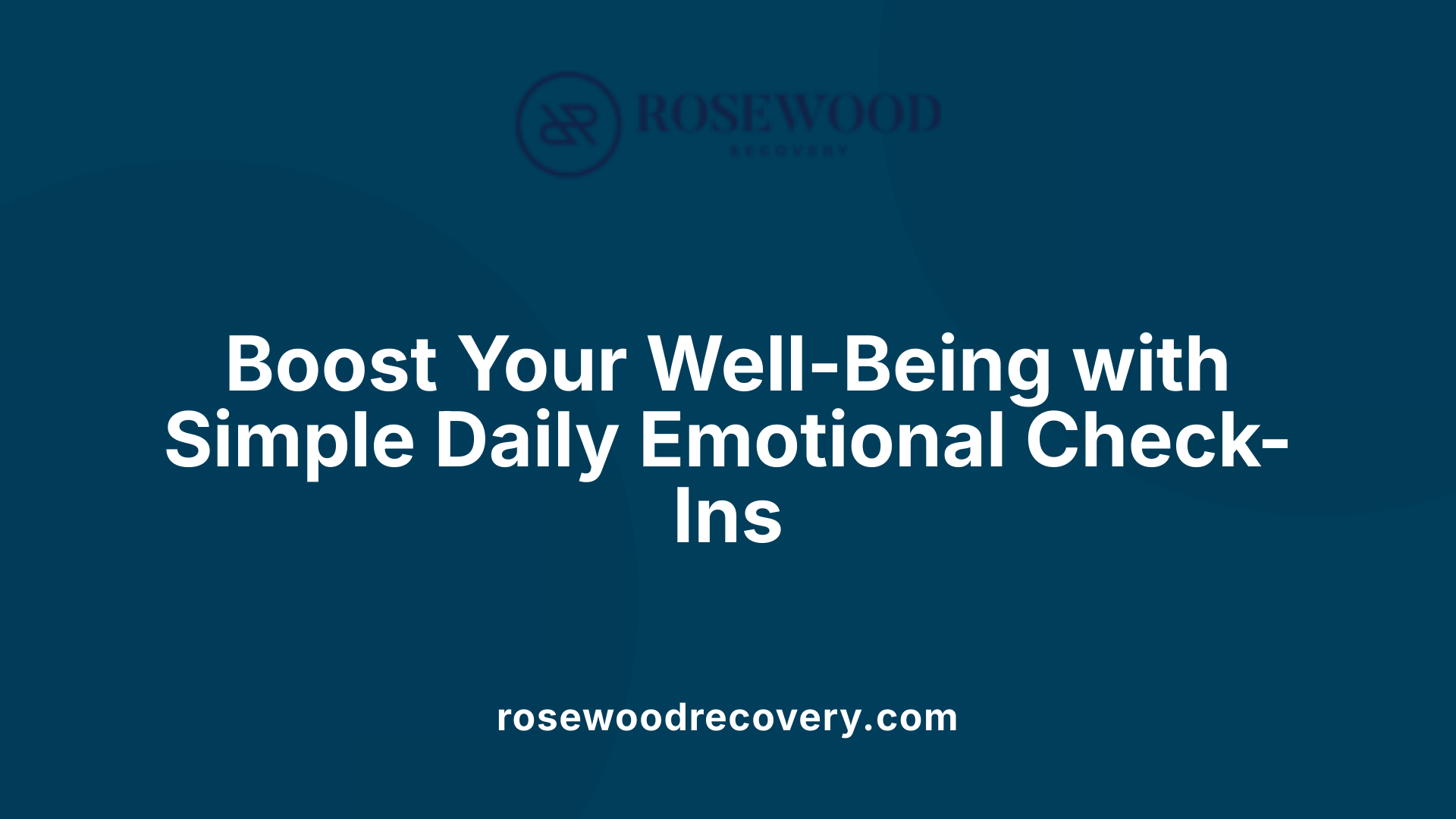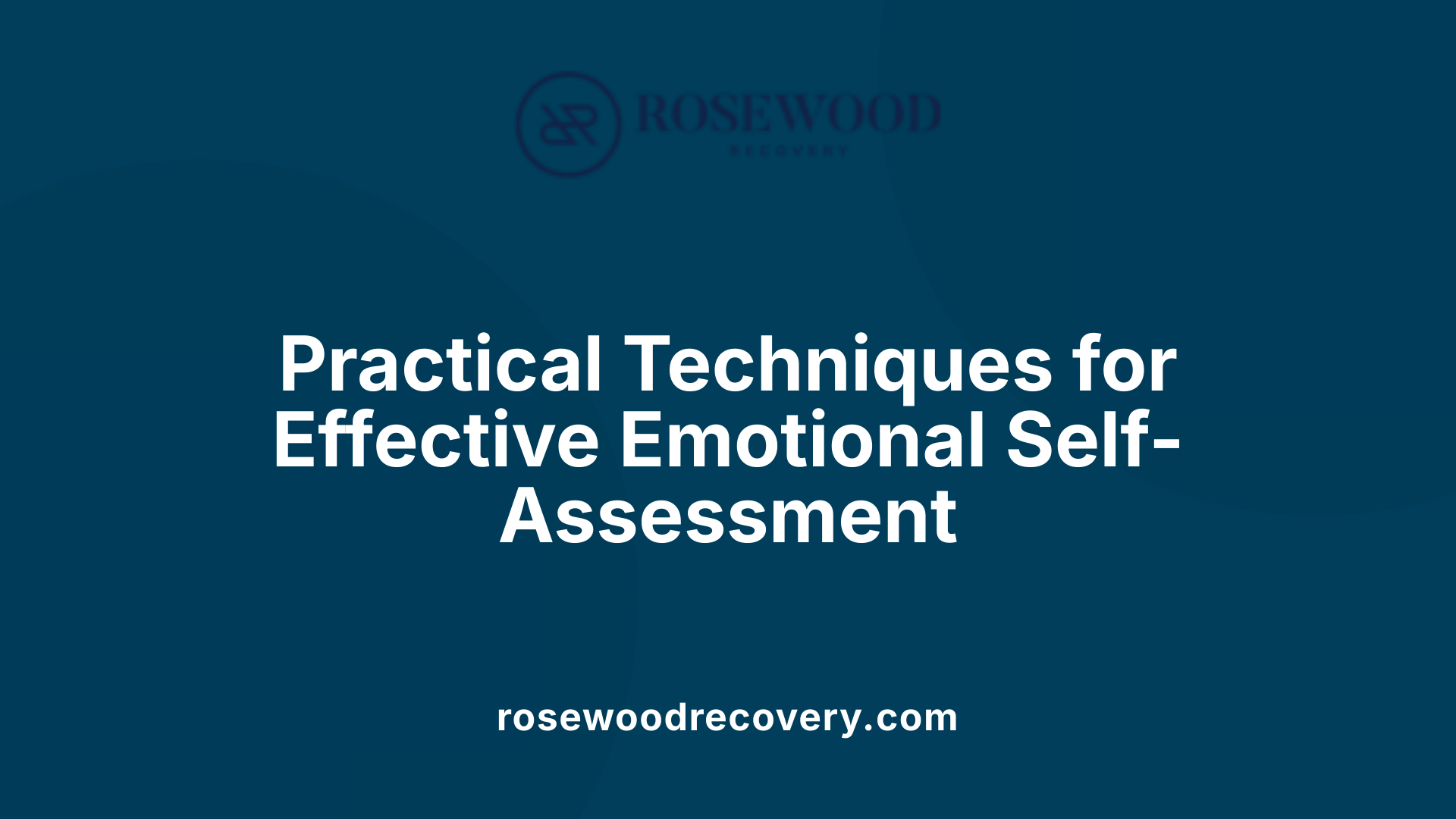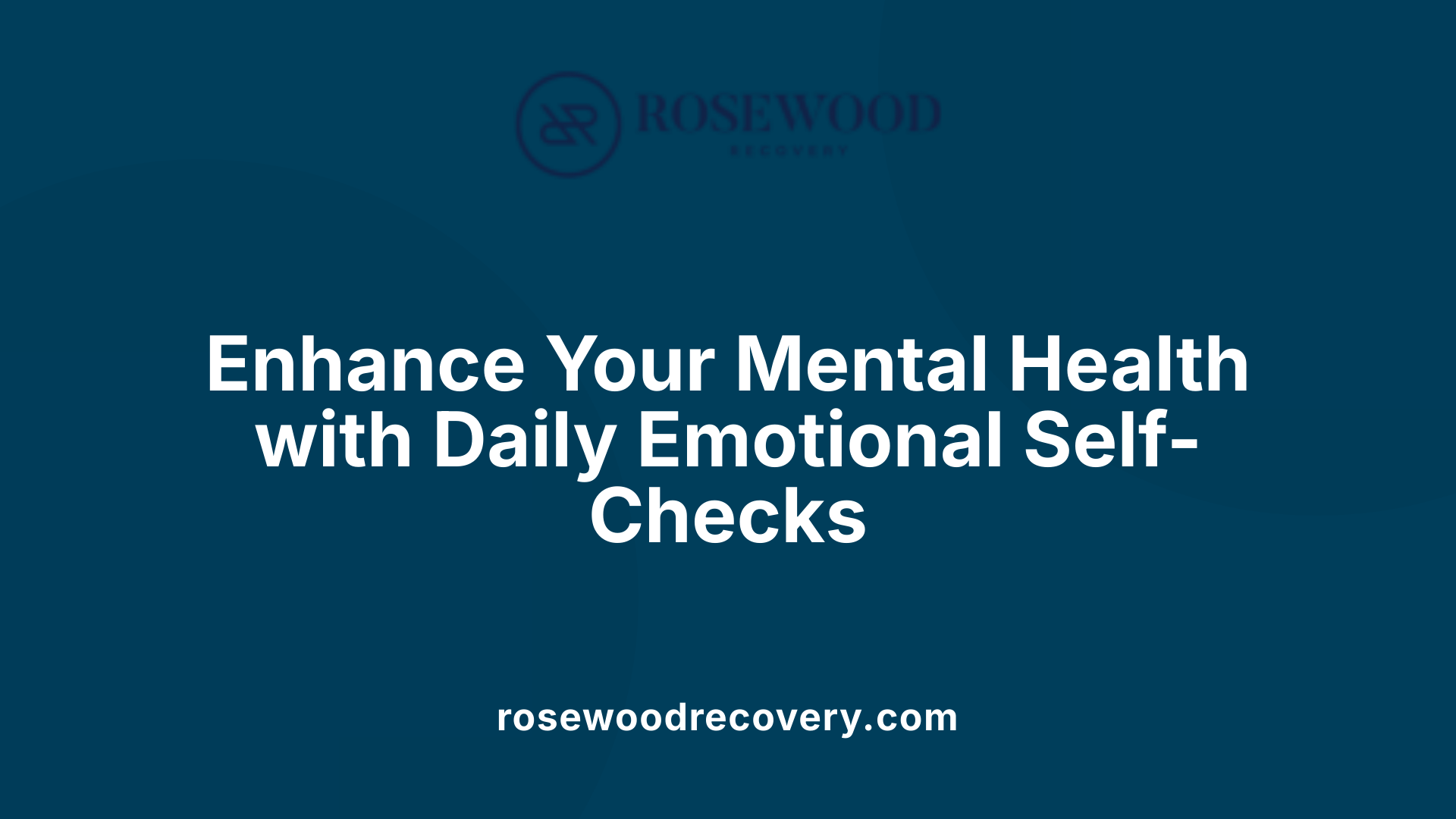Understanding the Significance of Emotional Self-Checks
In a fast-paced world filled with constant stimuli and challenges, maintaining emotional stability is essential for optimal mental health and overall well-being. Daily emotional self-checks—simple yet powerful practices—serve as vital tools that enable individuals to assess, understand, and regulate their feelings proactively. This article explores the science, methods, and benefits of incorporating daily emotional self-checks into routine life, demonstrating how these habits foster resilience, improve decision-making, and enhance emotional intelligence.
What Are Daily Emotional Self-Checks?

What are daily emotional self-checks?
Daily emotional self-checks are quick, deliberate practices where individuals pause each day to assess their emotional state. These practices involve asking oneself simple but meaningful questions such as "How am I feeling right now?", "What does my body need at this moment?", and "What self-care activity can I engage in?" These assessments are designed to boost self-awareness and help individuals recognize their emotional triggers and patterns.
Engaging in regular emotional check-ins can significantly improve emotional regulation by strengthening the neural pathways involved in managing feelings. For example, techniques like the '3-breath check-in' activate the prefrontal cortex, which helps in calming emotional responses and promoting clarity. Similarly, methods such as the traffic light approach—a visual cue system—assist in quickly identifying whether one is feeling calm, alert, or overwhelmed.
People who practice these short assessments daily often find they can manage difficult feelings before they spiral into overwhelm. Over time, this habit can also reveal personal trends, such as increased anxiety on certain days or after specific events, enabling preemptive self-care.
Using tools like journaling or apps that facilitate brief reflections, individuals can track their emotional patterns and celebrate progress, resulting in increased motivation and a more positive outlook. These routines act like emotional fitness exercises, strengthening the capacity to regulate feelings, which is supported by science highlighting neuroplasticity—the brain's ability to rewire itself through consistent practice.
In essence, making space for daily emotional self-checks not only fosters greater self-awareness but also contributes to overall well-being, improved decision-making, and better relationships.
The Science Behind Emotional Self-Checks and Their Impact on the Brain

What is the psychological basis for emotional self-checks?
The psychological foundation of emotional self-checks is rooted in the principles of emotional intelligence, which involve awareness, understanding, and regulation of emotions. When individuals regularly pause to reflect on their feelings — through practices like journaling, mindfulness, or quick mental scans — they actively engage neural pathways associated with emotional regulation.
Fundamentally, these self-assessments strengthen the connections between the prefrontal cortex, responsible for high-level thinking and impulse control, and the limbic system, which processes emotions. This enhanced communication helps individuals manage their reactions better, making responses more deliberate and less impulsive.
Practices such as the Body Scan, Three-Breath Check-in, or gratitude exercises cultivate an inward focus, allowing the brain to recognize emotions and bodily cues. Over time, these habits promote neuroplasticity, the brain's ability to rewire itself, leading to sustained improvements in emotional regulation.
Childhood experiences also influence these skills. Validation from caregivers fosters secure emotional development, while invalidation can hinder emotional awareness. Recognizing this, self-validation becomes a critical tool in cultivating empathy and resilience, enabling people to respond with kindness and understanding toward themselves.
Overall, emotional self-checks leverage psychological principles and neural mechanisms to enhance emotional intelligence, resilience, and well-being. They foster an internal environment where thoughts and feelings are acknowledged without judgment, promoting healthier emotional responses and stronger mental health.
How do neural pathways involved in emotional regulation develop and strengthen?
Emotional self-checks activate specific neural circuits, notably involving the prefrontal cortex and limbic system. Regular practice encourages these pathways to become more efficient through neuroplasticity, a property of the brain that allows for change and adaptation.
When individuals engage in targeted techniques like mindful breathing or pattern recognition exercises (e.g., traffic light method), they slow down the neural signals and reinforce beneficial pathways. This process diminishes impulsive reactions and enhances the brain’s capacity for emotional control.
Over days and weeks of consistent practice, research indicates improved communication between these regions. This improved neural connectivity results in quicker assessments of emotional states, better identification of triggers, and more effective regulation strategies.
How emotional self-checks enhance brain function
Daily emotional assessments serve as mental 'exercises' that bolster overall brain health related to emotional management. These practices increase activation of the prefrontal cortex, which helps in planning, decision-making, and moderating emotional responses.
Moreover, by regularly recognizing physical cues like tense shoulders or racing heart, individuals engage sensory and emotional processing centers, fostering a more integrated understanding of their emotional landscape.
Research shows that sustained self-awareness practices can lead to lasting neurobiological changes. For instance, consistent self-check-ins improve the neural pathways between the prefrontal cortex and limbic system within days to weeks. This enhanced neural communication results in better emotion regulation, reduced stress, and increased resilience.
| Aspect | Neural Pathways Involved | Impact on Brain Function | Techniques Enhancing Connectivity |
|---|---|---|---|
| Emotional awareness | Prefrontal cortex & limbic system | Improves impulse control and emotional responses | Mindfulness, body scans, quick emotional temperature checks |
| Habit formation | Neuroplasticity | Reinforces beneficial neural circuits, making regulation automatic | Regular check-ins, visualizations, pattern recognition exercises |
| Self-regulation | Prefrontal-limbic communication | Reduces stress, boosts mood, supports mental clarity | Deep breathing, gratitude practice, validation exercises |
In summary, daily emotional self-checks activate and reinforce neural pathways crucial for emotional regulation. This neuroplasticity fosters mental resilience, enhances decision-making, and sustains well-being over time, making these simple practices powerful tools for mental health improvement.
Methods and Practices for Effective Emotional Self-Checks

How can I perform effective daily emotional self-checks?
To practice effective daily emotional self-assessments, it’s essential to dedicate a few moments each day to check in with yourself. This could be as quick as a minute or two, but consistency is what matters most.
Start with mindfulness techniques like deep breathing exercises, such as the 3-breath check-in, which activate the prefrontal cortex and help regulate emotions. Simply take three slow, deliberate breaths, focusing on the sensation of air entering and leaving your body. This practice calms the mind and enhances emotional clarity.
The traffic light method is another useful tool. Visualize a traffic light: green indicates you're feeling balanced and ready, yellow signals caution or slight tension, and red represents intense emotions needing attention. Recognizing where you are on this spectrum can prompt you to take necessary steps, like pausing or practicing calming techniques.
Journaling is a powerful way to deepen awareness. During your check-in, ask yourself questions such as "How am I feeling right now?" and record your responses. Note physical cues like tense shoulders, racing heart, or shallow breathing, which often mirror emotional states.
In addition to these, methods like the Body Scan—focusing attention sequentially on different parts of your body—can reveal physical signs of emotional stress, aiding in early intervention.
Intentionality is also critical. Setting an intention at the start of your day (e.g., "Today, I will stay mindful of my feelings") or before specific activities helps direct your focus and enhances emotional insight.
Tracking your emotions over time with tools like the emotional temperature scale or highlighting key moments throughout the day can reveal patterns and triggers. For example, noticing increased nervousness on Monday mornings or after particular interactions can inform strategies to better cope.
Combining these practices creates a comprehensive approach to emotional self-awareness. When you routinely pause, reflect, and record your feelings, you bolster neural pathways involved in emotion regulation, leading to healthier responses and improved mental well-being.
Regular application of these methods also aids in recognizing unmet needs, practicing self-care, and fostering gratitude—all of which contribute to resilience and overall emotional balance.
Benefits of Daily Emotional Self-Checks for Mental Health and Well-being

What are the benefits of doing daily emotional self-checks for mental health?
Engaging in a brief daily emotional self-assessment can significantly improve mental health. These regular check-ins enhance self-awareness by helping individuals recognize their current feelings, bodily cues, and emotional patterns. When people know how they are feeling in the moment, they can take proactive steps to manage their emotions effectively before they escalate.
This practice also boosts emotional regulation, which is essential for maintaining mood stability and preventing issues such as anxiety or depression. For example, recognizing feelings of nervousness on a Monday or after a stressful event allows someone to apply calming techniques like deep breathing or mindful walking.
Furthermore, routine emotional self-checks foster resilience by making it easier to identify sources of stress and develop coping strategies. Over time, tracking emotions can reveal trends and triggers that impact well-being, which can be addressed consciously. This proactive approach supports quicker recovery from emotional setbacks.
Increasing emotional awareness through daily check-ins also enhances interpersonal relationships. When individuals understand their emotional states better, they communicate their needs and boundaries more clearly. This clarity helps build trust and empathy in interactions, improving personal and professional relationships.
Practical methods such as the '3-breath check-in' or the traffic light model can engage the brain's pattern recognition abilities and activate regions responsible for emotional regulation, like the prefrontal cortex. These techniques reinforce neural pathways, making emotional management easier over time.
Regularly checking in with oneself acts as a mental fitness exercise. It can be as simple as asking, 'How am I feeling right now?' and then reflecting on that answer. Keeping a journal, practicing positive affirmations, or engaging in self-care activities based on these insights further supports mental health.
In sum, daily emotional self-assessment is a simple yet powerful habit that fosters greater self-awareness, resilience, and healthier relationships. It equips individuals with the tools to handle life's emotional ups and downs more effectively, leading to improved mental health and overall well-being.
| Benefit | Description | Tools/Methods |
|---|---|---|
| Enhances emotional regulation | Recognizes emotional shifts early to prevent escalation | '3-breath check-in', Traffic light method |
| Promotes resilience | Identifies stressors and coping strategies over time | Tracking emotions, trend analysis |
| Fosters positivity and self-growth | Reflects on progress and fosters motivation | Journaling, celebration of achievements |
| Improves communication | Clarifies emotional needs for better relationships | Self-awareness exercises, honest reflection |
| Supports early intervention | Detects potential mental health issues early | Monitoring mood patterns, seeking professional help |
By making these quick, daily practices a habit, individuals can cultivate a more balanced, resilient, and emotionally intelligent life, helping them navigate both day-to-day challenges and long-term mental health goals.
Practical Strategies to Incorporate Emotional Self-Checks into Daily Life
How can I incorporate daily emotional self-checks into routines for resilience and stress management?
Integrating emotional self-checks into everyday routines is an effective way to build resilience and better manage stress. Begin by setting aside a specific time each day, such as during your morning wake-up or before bedtime, dedicated solely to emotional reflection. This consistency turns self-checks into a habit, making the practice more automatic.
A simple yet powerful tool is the traffic light system. This method helps you quickly recognize your emotional state by categorizing feelings as green (calm or positive), yellow (anxious or alert), or red (overwhelmed or distressed). This visual cue enables you to respond appropriately, like taking deep breaths when feeling yellow or engaging in self-care activities if feeling red.
Journaling amplifies your self-awareness by allowing you to record your emotional experiences, triggers, and patterns over days, weeks, and months. Tracking your feelings can unveil trends—such as feeling more nervous on Mondays or after social gatherings—and help you develop targeted coping strategies.
Adding mindfulness practices such as the 3-breath check-in—taking three slow, deep breaths to activate your prefrontal cortex—can calm your mind and increase awareness of your current emotional state. Pairing this with intention setting helps you clarify your goals for the day or plan gentle self-care actions.
Gradually incorporating these routines requires patience and self-compassion. Celebrate small successes, and if emotional management feels complicated, seeking support from a mental health professional can offer personalized tools and guidance.
Overall, these strategies promote resilience by fostering a proactive approach to emotional regulation, encouraging you to recognize, understand, and respond to your feelings before they escalate. Consistent practice creates neural changes in the brain, strengthening pathways involved in emotional control, which enhances mental wellbeing and provides a lasting foundation for handling life's inevitable stresses.
Harnessing the Power of Self-Awareness for a Healthier Emotional Life
Incorporating daily emotional self-checks is a powerful, evidence-based strategy that can significantly improve mental health, emotional resilience, and overall life satisfaction. By making a habit of pausing to reflect—using practical tools and mindful techniques—individuals develop a deeper understanding of their emotional patterns, triggers, and needs. This ongoing practice not only strengthens neural pathways involved in emotional regulation but also fosters a compassionate and proactive approach to self-care. As a result, people are better equipped to manage stress, enhance relationships, and pursue a fulfilling life with greater confidence and clarity. Embracing the power of daily self-assessment is a vital step toward emotional mastery and resilient well-being.
References
- Daily Emotional Check-Ins: A Habit That Can Change Your ...
- Understanding the Importance of Emotional Check-Ins
- The Science of Self-Check-Ins: How Regular Emotional ...
- The Power of Emotional Check-Ins: How They Can Improve ...
- Emotional self-regulation: how to check-in with yourself
- 7 Daily Self-Awareness Checks for Measuring ...
- DBT Self-Validation | Boost Self-Worth and Confidence
- Emotional Check-ins: Why You Need Them
- Daily Emotional Check-Ins: A Habit That Can Change Your ...




